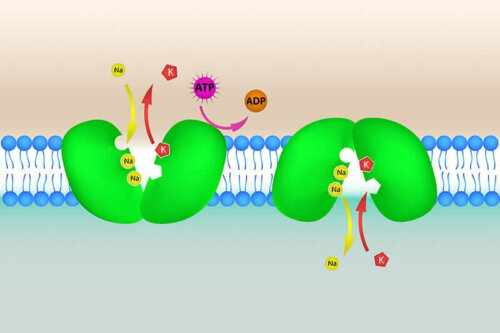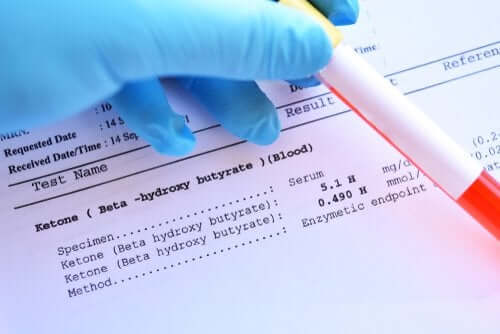Symptoms and Causes of Hyperpotassemia

Hyperpotassemia is a condition characterized by higher than normal levels of potassium. In contrast, hypokalemia happens when these levels are below normal.
The ranges of the studies usually indicate that the normal level of this electrolyte should be 5.5 mmol/L. Furthermore, patients with levels above this figure most likely have hyperpotassemia.
To better know and understand this condition, it’s important to broaden the concepts of potassium, the electrolyte in question.
Potassium and its functions in the body

Potassium is a mineral that participates in several reactions in the organism, from the muscles to the brain.
It’s both a macromineral and an electrolyte. The latter, such as chlorine or sodium, have an important function in the body. That is to participate in balancing the pressure and concentration of substances inside and outside the cells.
They also perform other functions such as:
- Bone growth and structure
- Protein contraction and synthesis
- Nerve transmission
- Osmotic balance
Symptoms
Usually, a person with high potassium levels is asymptomatic. This is why most cases of hyperpotassemia go unnoticed.
However, there are various symptoms in some people with high potassium levels. Whether they appear or not depends on the severity of the hyperpotassemia and the speed of its appearance. The first ones are usually related to muscular activity.
In this respect, a patient may feel tingling, muscle weakness, or tremors in the extremities. It’s also common to develop paresthesia in the fingers and toes. Paresthesia is an abnormal sensation of tingling, heat, or cold on the skin.
In the most severe cases, a patient may experience other symptoms that affect the activity of their heart, such as cardiac arrhythmias. The reason for this is potassium is also necessary for proper heart functioning. Thus, in short, hyperpotassemia will affect many body systems and could be unhealthy.
Read about the Six Types of Food that Contain More Potassium than Bananas
Causes of hyperpotassemia

Renal failure is the most common cause of hyperpotassemia. In this situation, the kidneys don’t properly excrete potassium, and the electrolyte increases in the blood.
However, other factors contribute to the development of this condition, such as
- An increase in the consumption of potassium-rich food (only rarely will an excess lead to hyperpotassemia)
- Side effects from drugs that affect kidney function
- Metabolic acidosis
Learn about Ten Types of Fruit that Are Rich in Potassium
Treatment of hyperpotassemia

Your doctor will prescribe treatment to lower your potassium levels. Moreover, they’ll focus on treating the cause.
The physician could prescribe various treatments according to the severity of the hyperpotassemia. In this respect, they’ll also prescribe the administration of potassium binding drugs or diuretics in those patients with a moderate increase in potassium levels. Also, they may require dialysis.
Salbutamol or baking soda are two substances that effectively improve the situation when the value of hyperpotassemia, is above 6.5 mmol/L — without alterations in the electrocardiogram.
Finally, they must prescribe medications that protect the heart, such as calcium chloride, when the previous situation occurs along with an altered electrocardiogram.
Other data about hyperpotassemia
As the name suggests, this condition is basically an increase in blood potassium levels above the normal 5.5 mmol/L. It affects the kidneys, most of the time.
Thus, doctors usually prescribe diuretics to enhance the function of these organs. In the most serious cases that also affect the heart, they’ll most likely recommend the administration of myocardial protective drugs such as calcium chloride as well.
Consult your doctor if you have signs of this condition so they can diagnose and recommend an appropriate treatment for your particular case.
All cited sources were thoroughly reviewed by our team to ensure their quality, reliability, currency, and validity. The bibliography of this article was considered reliable and of academic or scientific accuracy.
- Melgar, Á., & Muley, R. (2012). Trastornos del potasio. In Nefrología al día.
- Laborde, K. (2003). Trastornos del agua y de los electrólitos. EMC – Pediatría. https://doi.org/10.1016/s1245-1789(03)72053-8.
- Alfonso, D. A. G. (2002). Desequilibrio Hidroelectrolítico. In Temas de Guardia Clínicos y Quirúrgicos.
- Simon LV, Farrell MW. Hyperkalemia. [Updated 2019 Feb 16]. In: StatPearls [Internet]. Treasure Island (FL): StatPearls Publishing; 2019 Jan-. Available from: https://www.ncbi.nlm.nih.gov/books/NBK470284/.
- Lehnhardt A, Kemper MJ. Pathogenesis, diagnosis and management of hyperkalemia. Pediatr Nephrol. 2011;26(3):377–384. doi:10.1007/s00467-010-1699-3.
- Abuelo JG. Treatment of Severe Hyperkalemia: Confronting 4 Fallacies. Kidney Int Rep. 2017;3(1):47–55. Published 2017 Oct 7. doi:10.1016/j.ekir.2017.10.001.
This text is provided for informational purposes only and does not replace consultation with a professional. If in doubt, consult your specialist.









